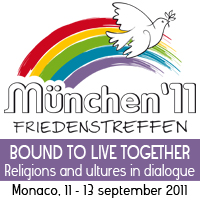Department of Foreign Affairs, Switzerland
|
Excellencies,
Ladies and Gentlemen,
I would like to contribute to this panel on “dialogue and peace in the Middle East” by looking at some of the effects and challenges of the current transformations in Northern Africa and the Middle East regarding prospects for Christian – Muslim relations in this regions.
Hereby, I will speak from an expert point of view on conflict transformation (this is a mandate received by the service I work for in the Foreign Ministry based on our Swiss constitution and a consequent decision from our Parliament), and not from a diplomatic point of view.
Christianophobia around the Mediterranean has echoed so-called “Islamophobia” – better referred to as movements of hostility towards Islam - that have been growing in Europe.
Christianophobia in the region has been recently a subject of renewed preoccupation for European countries – though the phenomena in itself in neither new nor, apparently, growing, with the exception possibly of Turkey.
The issue is of course complex. However, for the sake of addressing the challenges we are all facing, it is possible and justifiable, I suggest, to brush a canvas of it in not too complicated terms.
Tensions between Christian and Muslim communities in the region are not a new phenomenon. As Oliver Roy notes, these tensions can be traced to several factors:
Christians are often perceived as leftovers of colonization; as a fifth column of the West. These communities do also often seek refuge under dictatorship regimes, as it is frequently the case for minorities; and de facto, they have received targeted and preferential aid from the West. All these factors contribute to the construction of a negative image of local Christian communities.
The so called « Arab Spring » is potentially a chance and an opportunity for those minorities, insofar as the uprisings and political transformations in these countries lead to political systems based on citizenship, and not any more on old communitarian reflexes that have played into the “divide and rule” practices of dictators. Conversely, those actors who support counter-revolution tendencies would prefer the status quo ante, that is reestablish or reinforce inter-communitarian divisions.
Trans-communitarian experiences of cooperation and solidarity are no myths: in Egypt they have been practiced with success in and around the Tahrir square (to take this emblematic example), within the scope of neighborhood committees made up of Christian and Muslims jointly protecting religious sites. Such experiences of overcoming communitarian divisions are still going on in different places in Egypt, and can rightly be seen as being an important piece in the building of citizenship.
The questions and challenge are: can these experiences survive and multiply? And what can we, in the “West”, do about it?
I would argue that the best we can do is to avoid building or reinforcing obstacles to the strengthening of trans-communitarian and trans-partisan coalitions of actors in the region, be it in the humanitarian, the development or the political field.
Some of the obstacles that we can act upon are the following:
- Patterns of aid in the humanitarian and development field of the West have been focusing in the past and up to now on secular or Christian based organizations. The politics of humanitarian and development aid have been themselves divisive. What is needed is to overcome these divisions so that in those societies aid can be organized and provided jointly by all communities. This can and must be addressed. On the day after the commemoration of 9/11, one should add that the ban on aid to Muslim charities coming from post 9/11 terrorism prevention measures and policies are not helpful – indeed counterproductive, as they put obstacles to joint aid.
- Also, the habit of providing aid and training to chosen political parties is counterproductive. What is needed are joint political trainings for parties, and for the youth, in order to foster joint citizenship.
|

